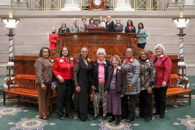JEFFERSON CITY, Mo. – It’s been 50 years since President Lyndon B. Johnson signed the Fair Housing Act of 1968 into effect.
And in 2018, the Missouri REALTORS are looking to keep the issue of fair housing at the forefront in Jefferson City and throughout the state.
To do this, they have joined several entities in hosting conferences and discussions in the month of April, which is “Fair Housing Month”, highlighting the history of where we have been, where we are now, and also looking forward to what might still come.
Roughly 20 people attended the annual Fair Housing Conference, hosted by Jefferson City, the Jefferson City Area Board of Realtors, the Missouri Commission on Human Rights, and River City Habitat for Humanity in Jefferson City on Monday afternoon.
Speaking at the conference, Rigel C. Oliveri, an associate professor of law at the University of Missouri, told those in attendance that the Fair Housing Act of 1968 was the third of the major civil rights laws that passed in the 1960’s.
The first was the Civil Rights Act of 1964, followed by the Voting Rights Act of 1965 and finally the Fair Housing Act. Oliveri said that, though the Fair Housing Act was first proposed in 1966, it did not go through until after the assassination of Dr. Martin Luther King, Jr., which she said led Congress to pass the act with almost no debate in record time.
But since then, she said, it’s become the one act that is now being viewed as the one that has underperformed.
Oliveri said that the issue of housing discrimination is still just as relevant, with an estimated 4 million instances of discrimination occurring each year. In 2016, 28,181 complaints had been filed.
Under federal law, people are protected from discrimination, whether it be race/color, national origin, religion, sex, disability or familial status.
But in recent times, the Fair Housing Act has come under fire. According to Oliveri, the current administration does not place much emphasis on continuing the work of fair housing, noting that a lot of funding, particularly for the U.S. Department of Housing and Urban Development (HUD).
Discussing whether HUD would continue providing affordable housing and community development assistance, Oliveri stated that President Donald Trump’s budget currently calls for the zeroing out of the community development portion of the HUD budget.
As for the status of fair housing in Missouri, Eric Krekel, the director of investigative operations for the Missouri Commission on Human Rights, spoke about the changes brought forward by the passage of SB 43, which requires higher standard of proof from a contributing factor to the motivating factor and put caps on damages that plaintiff can get in court from $50,000 to $500,000, depending on size of the employers, among other things.
But several issues had been located after the passage, the most notable of which has been the notification from HUD to the Missouri Commission on Human Rights, which stated that MCHR would be withdrawn from the program if Missouri’s statute are not brought back into compliance with the federal standards.
Krekel said that because of this, Missouri is losing funds, which in turn puts a strain on their funding and resources.
But, as Oliveri noted, there has been some progress. In recent court decisions and interpretations of the law had led to the inclusion of LGBT under the list of protected individuals. According to MO REALTORS, only 20 states currently have non-discrimination housing laws that encompass sexual orientation and gender identity.
For HUD and MCHR, as well as organizations like the REALTORS, the fight for fair housing will continue down the road, with the mission of ensuring fair and equal housing opportunities for everyone.
Benjamin Peters was a reporter for The Missouri Times and Missouri Times Magazine and also produced the #MoLeg Podcast. He joined The Missouri Times in 2016 after working as a sports editor and TV news producer in mid-Missouri. Benjamin is a graduate of Missouri State University in Springfield.












